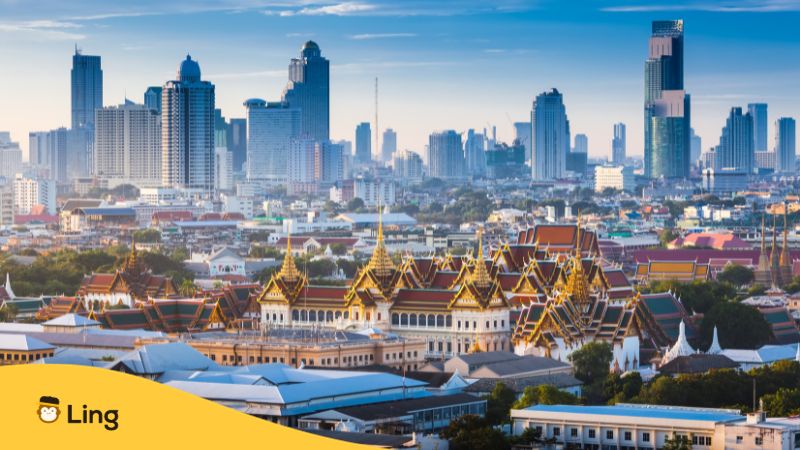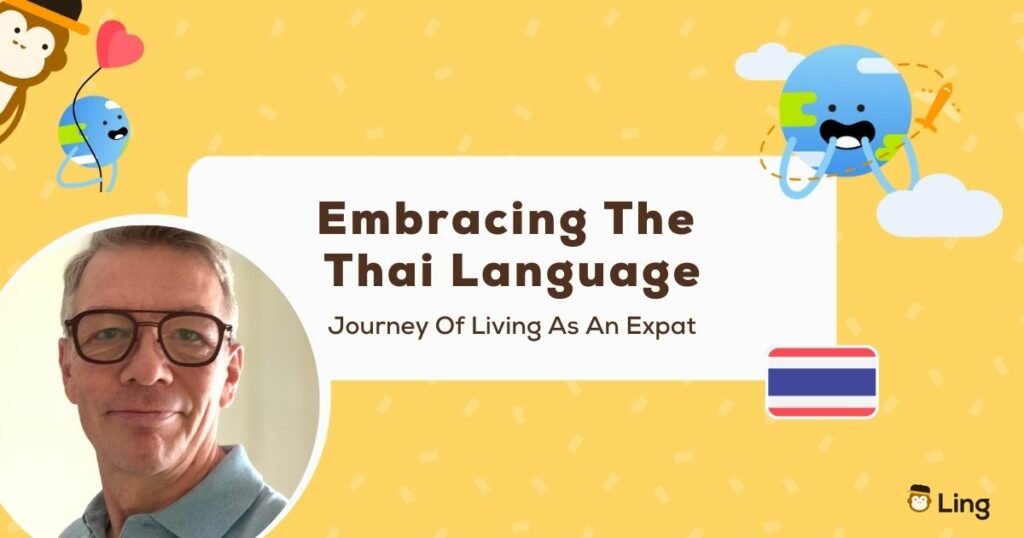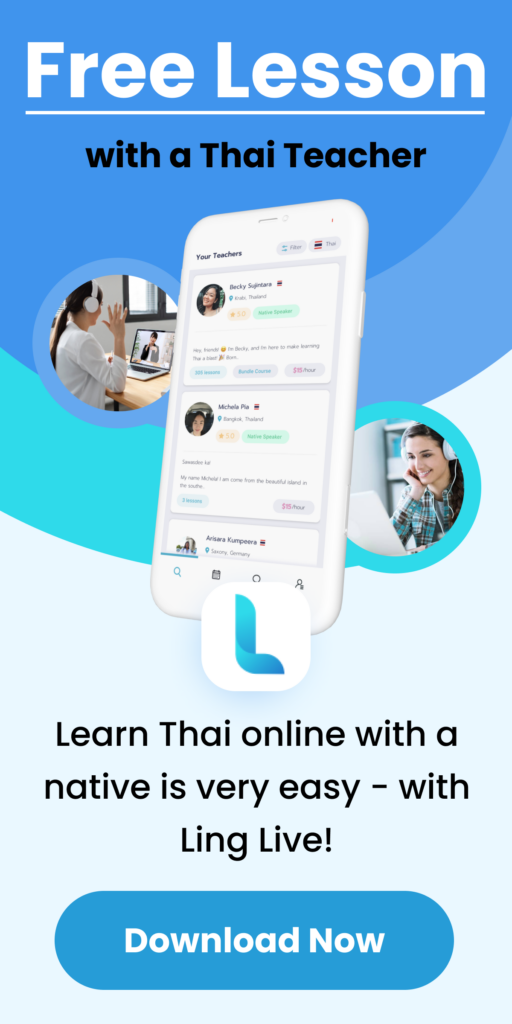Today, we’re diving dip into the fascinating world of languages through the eyes of one of our users. Inspired by his incredible language journey, we sat down with Arne Blom to learn from his experience traveling the world and navigating multiple languages along the way.
If you’re curious about learning languages, especially one as intriguing as Thai, you’ll find the insights and tips in Arne’s story very helpful. Plus, it’s not every day you hear about someone so passionately embracing new cultures and languages, right?
So, join us as we embark on a linguistic voyage with someone who knows what he’s talking about when it comes to languages. You’ll find interesting anecdotes, tips, and a quick exploration on how the Ling app has been helpful to his journey when it comes to learning the Thai language.
Arne’s Early Exposure To Languages
Born in Norway to a Norwegian father and a French mother, Arne’s life was a blend of languages right from the beginning. Imagine living in Norway but growing up in a home where French is the primary language. Quite fascinating!
This bilingual, bicultural environment laid the foundation for his love for languages. Furthermore, this early exposure sparked a lifelong passion in Arne, leading him to learn German and English at school.
Around The World With Languages
Fast-forward a bit, and Arne’s linguistic adventure takes him to Paris. French was already in his arsenal, so this was more about refining his skills. He met his wife there, and they spent 15 years in the country before deciding to move to London.
Now, don’t think his journey had only a couple of stops; there’s more! Arne then moved to Mexico, where he learned Spanish, to Belgium, learning Flemish, and then to Portugal, where he, of course, learned Portuguese. He even spent some time in Hong Kong after that!
Finally, and this is where we catch up with him, he moved to Thailand. Arne tells us that this decision was, in a way, a different one. All his travels before had been because of his work, whereas this move was more of a personal decision for him and his wife.
Moving from place to place, learning the local language along the way, highlights the importance of a vital point about language learning: immersion. By living in these diverse linguistic environments, Arne didn’t just learn the languages; he lived them.

About Multilingualism: How Do Polyglots Learn So Many Languages?
If you’ve read this far, you might be wondering how rare is it to speak so many languages. In Arne’s case, the bilingual environment in which he grew up certainly was the starting point, but coming into contact with so many languages during his travels surely helped.
Still, the answer to this question might surprise you. From the insights we have gained by listening to Arne and Kazimira, our user who learned Lithuanian, we can tell you that polyglots learn languages in the same way we do! In short, through perseverance and hard work. Of course, there are many techniques for language learning, but at the end of the road, every learner uses the methods that work best for them, be they language-learning apps, traditional courses, total immersion, or any other.
Now, maybe you’ve been counting and realized Arne speaks 8 languages (we’ll count Thai, too, even if he’s still learning!). Naturally, the next question on your mind might be, how rare is this? How rare is it to be a polyglot?
Well, only around 3% of people around the world can speak over four languages, which is roughly 240 million people. So Arne, who says that for work purposes he only considers himself fluent in Norwegian, French, English, and Portuguese, is part of a select yet large club of language masters.
Embarking On The Thai Language Learning Quest
The quest to learn Thai was a bit more intimidating than Arne’s previous experiences. Age plays a tricky role in language acquisition, for one. But who doesn’t love a good challenge, right? Plus, learning Thai was not just about mastering a language; for Arne, it had a deeper meaning: connecting with a new culture and community.
Arne is adamant about the importance of learning the local language. He says, “You get into a very different level of relationships when you speak even a little bit of the local language.” To illustrate this, he told us a little about his experience with mountain biking in Bangkok.
Every month, the group he belongs to go out for a weekend. Practicing this adventure sport takes him to the countryside, where Arne interacts with people in small villages or farms who don’t speak any English. It means a lot to him to be able to interact with them and explain what they’re there for, bringing a little business to them as well. He appreciates being able to connect with people he probably wouldn’t interact with normally.
The Role Of The Ling App In Arne’s Thai Language Journey
After deciding to move to Thailand, his wife started learning the language a little before him, taking lessons with a private tutor even before they came to Bangkok. Arne didn’t have that option. Moreover, he felt that he needed, in his own words, “something where I could learn along with my own rhythm. Not necessarily be obliged to go to a lesson or something, every week […] And basically learn what you want to, as you want to”.
He thinks the Ling app is perfect for that. “Because it’s on your phone, it’s available whenever you need it. The only challenge basically is to actually use it properly and use it as often as you should do to really learn something”. And we’ve all been there, haven’t we? Consistency is tough, but it’s vital!
So the Ling app was Arne’s trusty sidekick in this Thai adventure, giving him the kind of freedom any language learner would dream of. But here’s the kicker: balancing app-based learning with real-world interactions. And this is when he speaks very positively about his experience with the locals in Thailand, mentioning that if you speak even a few words of Thai, they know you’re making an effort and are very receptive.
As such, Arne emphasizes that while apps are fantastic tools, the true essence of language learning lies in engaging with people. It’s about striking that perfect harmony between digital learning and real-life conversations. His tip for other language learners? “Go out there and practice”. He adds that this helps anchor the language well in your mind; after that, it’s much easier to use!
When asked what role the Ling app played in his learning routine, Arne shares that when starting to learn Thai, many words sound similar, and it’s challenging to separate and identify them. And here’s where the Ling app comes in, as he says it helps you associate the word with visual elements, engaging more senses. He finds this an important way to learn.
Furthermore, he likes that the Ling app is very gradual, taking a small subject at a time. And he loves the review option, finding it a very powerful tool, emphasizing the importance of being able to re-examine what you have learned.

Cultural Integration Through Language
Arne’s experiences in Thailand and the world highlight a profound truth: language is a bridge to cultural understanding. His interactions, like those during mountain biking trips, open doors to meaningful connections with the locals. It’s incredible how even a few words in Thai can enrich these interactions, right? Arne’s journey is a reminder that learning a language is more than just memorizing words and grammar.
We’ve journeyed with Arne through the world and ended up in Thailand. We’ll certainly be wondering where he’s going next! For now, we’ll end this article with his helpful advice: “If you say something awkward or that people don’t understand, nothing bad happens really, right? They just don’t understand what you’re saying!” Considering this, he encourages language enthusiasts to get in touch with people; to try to use at least one word, even if only to say hello.
So, if you’ve been using the Ling app for some time now and feel ready to venture into the real world to chat with the locals, follow his advice: Don’t be shy, and go out there and practice!




































































